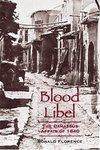
Book Summary
In Damascus in February 1840, a Capuchin monk and his servant disappear without a trace. By the end of the day, rumors point at the local Jewish community, a tiny minority in the city. Within weeks, the rumors turn to accusations of ritual murder--the infamous "blood libel." Torture, coerced confessions, manufactured evidence, and the fury of the crowds are enough to convict the accused Jews. By the time the rest of the world learns of the events in Damascus, the entire leadership of the Jewish community is awaiting execution. "Blood Libel" is a story of unexpected history. If the charges of ritual murder seem familiar--similar accusations have been heard in Europe for centuries and are heard in the Middle East today--nothing in Damascus happened as we, or contemporaries, might have anticipated. The accusers of the Jews were not the Muslim majority. The French consul, the representative of the nation that had given the world the Rights of Man and had been the first to grant Jews the full right of citizenship, was the chief prosecutor. The British consul, serving under the enlightened Lord Palmerston and the new Queen, aided the prosecution. The American consul supported the charges. The Sultan, famed for the excesses of his court and his arbitrary rule of the vast Ottoman empire, and the Austrians, who tightly restricted the rights of Jews in their own empire, defended the accused Jews. The venerable London Times printed reports that defied its liberal reputation, while conservative Austrian and French newspapers took the equally unexpected opposite stand. As news of the Damascus accusations spread, diplomacy and confused loyalties made for strange bedfellows. Misperceptions, mutual fears, and isolation fueled the passions in Damascus. When the affair and the implications for the perceptions of world Jewry became a cause celebre in Europe and the Americas, the priorities of diplomacy intervened: a rescue mission forgot the real victims in Damascus, and the fabric of a society that had once stretched to tolerate minorities finally burst in an outrage of fears turned to fury. The legacies of that torn fabric are the divisions of the Middle East today and the continuing myths that feed and sustain the fervor of anti-Semitism.
Book Details
| Book Name | Blood Libel: The Damascus Affair Of 1840 |
| Author | Ronald Florence |
| Publisher | University Of Wisconsin Press (Oct 2004) |
| ISBN | 9780299202804 |
| Pages | 257 |
| Language | English |
| Price | 979 |








